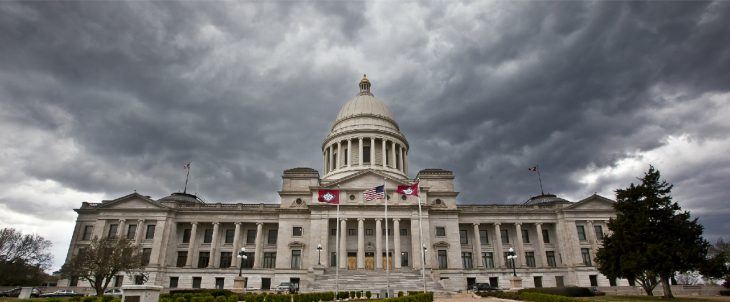Panel advances proposed constitutional amendment to allow legislature to call itself into special session
by April 19, 2021 4:12 pm 1,262 views

Should the Arkansas Legislature have the power to call itself into an extraordinary session?
The Senate State Agencies and Governmental Affairs Committee on Monday (April 19) passed SJR 10, a proposed change to the state constitution for voter consideration. The resolution could be one of three proposals that legislators refer to voters for the 2022 general election.
Before it was passed, sponsor Sen. Breanne Davis, R-Russellville, presented an amendment to the bill. It would allow the legislature to come into a special session if two-thirds of the House and two-thirds of the Senate vote for it. The reasons for opening a special or extraordinary session must be specifically stated, she said.
The bill originally allowed for an extraordinary session to be called if the Speaker of the House and the Pro Tempore of the Senate decided to do so.
The latest impetus for this proposal comes from legislators who have been pushing for this expansion of power since last year when Gov. Asa Hutchinson issued a number of directives to deal with the COVID-19 pandemic. The Arkansas Constitution only allows the governor to call for a special session of the legislature and it requires him to provide a specific agenda, known as “a call” for the special session.
Gov. Hutchinson addressed SJR 10 in a Sunday Talk Business & Politics interview. He doesn’t think the amendment is a good idea, saying it would set a dangerous precedent that would allow for the expansion of governmental power that is unneeded.
“Now, I hope that it does not go to the ballot for a vote on a referred constitutional amendment that would allow the legislature to call themselves into session. Historically, we’ve had a part-time legislature that meets once every two years in regular session. Well, this would convert it into really a full-time legislature,” the governor said.
Hutchinson, who has no authority over legislatively-referred proposed constitutional amendments, said he understands why some legislators want to curtail executive branch powers.
“Their perception is that the executive branch is very powerful and the legislative branch is not strong enough, and they want to strengthen that. I think you’ve got to step back a little bit and understand that under our constitution, the governor has a lot of respect but structurally the legislature has a lot of power, particularly with the purse strings,” he added.
The governor noted there should always be some friction between the branches of government. It’s the way our forefathers designed the system, he said.
“That’s the separation of powers. So, we should not be frustrated by that friction. We need to respect each other and work through in a cooperative way on many of these issues,” Hutchinson said. “But no, I disagree with the legislature being able to call themselves into session, and hopefully, that will not be one of the amendments that come out.”
SJR 10 must pass the full Senate and the House before it would be deigned one of the three proposals for voters in 2022.
Last week, House members passed HJR 1005, the Constitutional Amendment and Ballot Initiative Reform Amendment, by Rep. David Ray, R-Maumelle. It would raise the bar for amending the state Constitution or passing a voter-led initiated act from 50% to 60% for passage. Referenda, where voters review a legislative act, would continue to require only a 50% threshold. HJR 1005 would apply to ballot measures whether they are referred by the Legislature or are citizen-sponsored.
